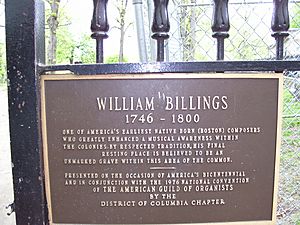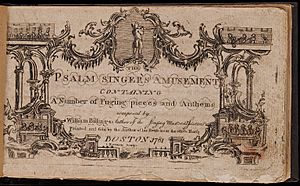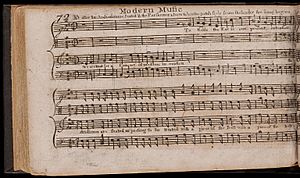William Billings facts for kids

William Billings (born October 7, 1746 – died September 26, 1800) was a very important American composer. Many people see him as the first American choral composer. He was also a key member of a group called the First New England School of music.
Contents
Life of William Billings
William Billings was born in Boston, Massachusetts. When he was 14, his father passed away. This meant William had to stop school to help his family. He trained to be a tanner, which is someone who prepares animal hides.
Billings probably learned music from John Barry, a singer at the New South Church. But mostly, he taught himself. People said he looked a bit unusual. He was also very fond of snuff, a type of tobacco. One person who knew him said he was "a singular man," meaning unique. They noted he was short, had one eye, and walked with a limp. Despite this, he was seen as a very smart person.
His wife died in 1795, leaving him with six children. William Billings died in Boston in 1800, living in poverty. His funeral was announced in a local newspaper.
Billings' Music
Almost all of Billings' music was written for a four-part chorus. This means it was sung by four different groups of voices. They sang a cappella, which means without any instruments.
He published many of his hymns and anthems in collections, which were like music books. Here are some of his famous collections:
- The New-England Psalm-Singer (1770)
- The Singing Master's Assistant (1778)
- Music in Miniature (1779)
- The Psalm-Singer's Amusement (1781)
- The Suffolk Harmony (1786)
- The Continental Harmony (1794)
Sometimes, Billings would make changes to a song. He would then include the new and improved version in his next book.
Billings' music could be powerful and exciting. A great example is his patriotic song "Chester". His hymn "Africa" sounds joyful and spiritual. Other pieces, like his "Easter Anthem" and "Rose of Sharon", are grand and celebratory.
He also wrote a funny piece called "Jargon." He wrote it to respond to people who criticized his music style. "Jargon" has a silly text and sounds that might seem strange. These sounds were very unusual for music in the 1700s. After "Jargon," he wrote a piece called "To the Goddess of Discord."
Billings also created several Christmas carols. These include "Judea" from 1778 and "Shiloh" from 1781.
Billings as a Writer
Song Lyrics
Most of the words Billings used in his songs came from the poems of Isaac Watts. He also used texts from other poets. Billings himself wrote the words for about a dozen of his own songs.
Teaching Music
Billings wrote long introductions to his music books. In these, he explained how to understand music. He also gave advice on how his songs should be performed. His writings show that he had a lot of experience teaching music.
Singing Schools
Billings spent his life teaching in singing schools. These schools taught people how to sing. In 1769, when he was 23, an announcement appeared in a Boston newspaper. It said that John Barrey and William Billings were opening a singing school. They promised to teach anyone who wanted to learn to sing.
In 1774, he taught a singing school in Stoughton, Massachusetts. He was listed as a "singing master" in the Boston city directory until 1798. In his book The Singing Master's Assistant, Billings gave tips for running a singing school. He talked about how to organize classes. He also explained how students should behave and listen to the teacher.
Legacy and Influence
- The Stoughton Musical Society was started by Billings' former students. This group has kept his music alive for over 200 years. Their 1878 music collection included 27 of Billings' songs. Some favorites are "Majesty" and "Chester."
- The American composer William Schuman used Billings' songs in his work New England Triptych (1956). He included "Chester," "When Jesus Wept," and "Be Glad Then, America."
- William Billings was added to the Songwriters Hall of Fame in 1970.
- In 1980, American composer Roger Lee Hall created a choral work called "The Pleasures of Variety - Homage to William Billings."
- Modern dance choreographer Twyla Tharp created a dance piece in 1996. It was called "Sweet Fields" and used many hymns by Billings.
- American composer John Cage used parts of Billings' music in his works. These pieces were created for the bicentennial celebration in 1976. They include "Apartment House 1776" and "44 Harmonies."
Billings' Published Works
You can find all of William Billings' music in a special collection. It's called Complete works of William Billings and has four volumes. Karl Kroeger and Hans Nathan edited these books.
- The New England psalm-singer. University of Virginia Press (1981).
- The Singing Masters Assistant, Music in Miniature. University of Virginia Press (1984). ISBN: 0-8139-0839-6.
- The Psalm-Singer's Amusement. University of Virginia Press (1987). ISBN: 0-8139-1130-3.
- The Continental Harmony. Harvard University Press (2013). ISBN: 978-0-674-18830-3.
See also
 In Spanish: William Billings para niños
In Spanish: William Billings para niños
 | Chris Smalls |
 | Fred Hampton |
 | Ralph Abernathy |



